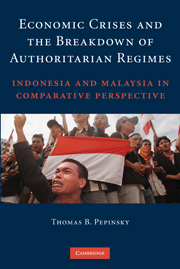 Economic Crises and the Breakdown of Authoritarian Regimes
Economic Crises and the Breakdown of Authoritarian Regimes Published online by Cambridge University Press: 21 January 2010
This book has investigated how authoritarian regimes grapple with financial crises. I argue that different coalitions of regime supporters yield predictably different adjustment policy responses, which in turn have powerful impacts on regime survival. Coalitions vary according to their economic profiles. I study the preferences of three types of economic actors that can support nondemocratic regimes – mobile capital, fixed capital, and labor – and argue that the twin pressures of an insolvent banking sector and currency depreciation put the interests of mobile capital at odds with fixed capital and labor. The key is mobile capital's ability to redeploy assets abroad in response to poor economic conditions or unfavorable economic policies at home. Both fixed capital and labor, unable to divest and move overseas, will welcome capital account restrictions to facilitate expansionary macroeconomic policies. Accordingly, mobile capital prefers an open capital account with neutral macroeconomic policy (orthodoxy), whereas fixed capital and labor prefer a closed capital account with interventionist macroeconomic policy (heterodoxy). Across financial crises in emerging markets, we observe struggles over adjustment policy that follow this split between holders of fixed capital – often in alliance with labor, or strategically forming “nationalist” or “populist” alliances – and mobile capital, usually painted as disloyal, manipulative, or unpatriotic.
When authoritarian regimes have support coalitions that include both mobile and fixed capital, they face mutually incompatible adjustment policy pressures. Adjustment policy conflict in such regimes ultimately brings them down, with the support coalition fracturing across the cleavage of mobile capital versus fixed capital.
To save this book to your Kindle, first ensure [email protected] is added to your Approved Personal Document E-mail List under your Personal Document Settings on the Manage Your Content and Devices page of your Amazon account. Then enter the ‘name’ part of your Kindle email address below. Find out more about saving to your Kindle.
Note you can select to save to either the @free.kindle.com or @kindle.com variations. ‘@free.kindle.com’ emails are free but can only be saved to your device when it is connected to wi-fi. ‘@kindle.com’ emails can be delivered even when you are not connected to wi-fi, but note that service fees apply.
Find out more about the Kindle Personal Document Service.
To save content items to your account, please confirm that you agree to abide by our usage policies. If this is the first time you use this feature, you will be asked to authorise Cambridge Core to connect with your account. Find out more about saving content to Dropbox.
To save content items to your account, please confirm that you agree to abide by our usage policies. If this is the first time you use this feature, you will be asked to authorise Cambridge Core to connect with your account. Find out more about saving content to Google Drive.